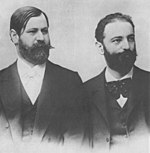Wilhelm Fliess
| Wilhelm Fliess Wilhelm Fließ |
|
|---|---|

Fliess (right) and Sigmund Freud
in the early 1890s. |
|
| Born | 24 October 1858 Arnswalde, Province of Brandenburg (today Poland) |
| Died | 13 October 1928 (aged 69) Berlin, Province of Brandenburg |
| Nationality | German |
| Fields | Otolaryngology |
Wilhelm Fliess (German: Wilhelm Fließ; 24 October 1858 – 13 October 1928) was a German Jewish otolaryngologist who practised in Berlin. He developed highly eccentric theories of human biorhythms and a possible nasogenital connection that have not been accepted by modern scientists. He is today best remembered for his close personal friendship and theoretical collaboration with Sigmund Freud, a controversial chapter in the history of psychoanalysis.
Fliess developed several idiosyncratic theories, such as 'vital periodicity', forerunner of the popular concepts of biorhythms. His work never found scientific favor, though some of his thinking – such as the idea of innate bisexuality– was incorporated into Freud's theories. Fliess believed men and women went through mathematically fixed sexual cycles of 23 and 28 days, respectively.
Another of Fliess's ideas was the theory of 'nasal reflex neurosis'. This became widely known following the publication of his controversial book Neue Beitrage und Therapie der nasaelen Reflexneurose in Vienna in 1892. The theory postulated a connection between the nose and the genitals and related this to a variety of neurological and psychological symptoms; Fliess devised a surgical operation intended to sever that link.
On Josef Breuer's suggestion, Fliess attended several conferences with Sigmund Freud beginning in 1887 in Vienna, and the two soon formed a strong friendship. Through their extensive correspondence and the series of personal meetings, Fliess came to play an important part in the development of psychoanalysis.
Freud, who described Fliess as "the Kepler of biology", repeatedly allowed Fliess to operate on his nose and sinuses to cure his neurosis and also experimented with anaesthetization of the nasal mucosa with cocaine. Together, Fliess and Freud developed a Project for a Scientific Psychology, which was later abandoned. Fliess wrote about his biorythmic theories in Der Ablauf des Lebens.
...
Wikipedia
